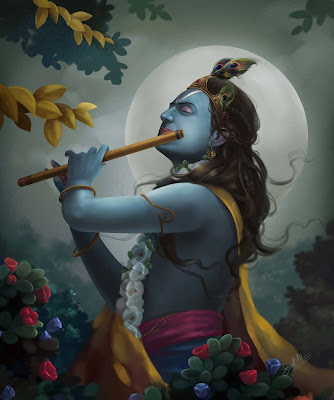CHAPTER CLXXX
(KRISHNA'S BATTLE WITH JVARA (FEVER))
Vaishampāyana said:—Thus conversing with one another they, holding mace, club and ploughshare respectively huge like mountain summits, rode Garuda the foremost of birds. Thereupon, O Janamejaya, when Rohini's son engaged in the battle his form grew dreadful like Kāla, as if desirous of consuming all, at the end of a cycle. Ranging in the battle-field the highly powerful Baladeva, expert in fighting, drew the enemies with his plough-share and grinded them with his mace. The highly powerful Pradyumna, the foremost of men, thwarted the fighting Dānavas with his arrows. Blowing his conch-shell Janārddana, the holder of conch-shell, discus and club, resembling a mass of collyrium, fought in many ways. Having struck the Daityas with his wings and mutilated them with his nails and beak the intelligent son of Vinata despatched them to the abode of Yāma. Thus assailed with a downpour of arrows and overpowered by those four heroes the dreadful army of the Asuras fled away from the battle-field (64–70).
Beholding his army thus routed and with a view to protect them Rudra's follower, Jvara, came walking to the battle-field sighing again and again like a maniac. He had three legs, three heads, six arms, nine faces and a consuming weapon and was like Yama himself. He roared like thousands of muttering clouds, sighed and yawned repeatedly, was dozing, had his hairs erect and eyes filthy. Having made his face more terrible with his eyes he, in anger, said to the holder of plough-share:—(71–74). "Why are you elated with the pride of your strength? Do you not see that I have come to the battle-field? Wait a few moments. While you have come before me in the battle-field you will not return with your life." Saying this, smiling and showing his fist dreadful like the fire of dissolution Jvara ran towards Halāyudha (75–76). Rohini's son however began to move about so quickly in thousands of circular ways that Jvara could not find an opportunity. Then aiming at his body huge like a mountain Jvara, of incomparable energy, hurled his consuming weapon which fell on his breast. Dropping on the summit of the mount Sumeru from Rāma's breast that burning weapon shattered it into pieces. Krishna's elder brother was however being consumed by the remnant that was left on his breast. Sighing and yawning every moment he began to move about recklessly. His eyes were dilated, hairs stood erect and all his senses were bewildered. He began to sigh like a maniac. Thereupon almost losing consciousness Haladhara said to Krishna:—"O Krishna, O large-armed Krishna, O thou the giver of protection, I am being consumed, nay I am being consumed completely. How shall I be saved?" Thus addressed by the highly powerful Bala Krishna, the foremost of strikers, smilingly said:—"No fear." Saying this he embraced Halāyudha (77–84). He was then saved by loving Krishna from being burnt. Having saved Rāma from being consumed the slayer of Madhu, Vasudeva, highly angered, said to Jvara:—"O Jvara, come and fight with me. Show to me the extent of your strength and power in this battle". Thus addressed the highly powerful Jvara, with his right hand, discharged his great burning weapon on Krishna's body. At this the powerful Krishna, the foremost of strikers, experienced a burning sensation for a few moments. Immediately after the fire was put out. Thereupon Jvara, with his serpent-like long arms, struck Krishna on the neck and then dealt a blow on his breast. Thus there took place a great encounter, in the battle-field, between Jvara and the highly energetic Krishna the foremost of men. The sound of the stricking of arms caused by Krishna and Jvara in that highly dreadful battle was like that of a thunder striking a mountain summit. Occasionally was heard "Do not strike in this way: you should do it in this way." In that great battle those two highly powerful ones so fought for a moment, that Lord of the Universe, under the guise of a man, thinking that he would come to an end, grinded the sky-ranging Jvara adorned with golden ornaments with his arms (85-93).
Source: https://archive.org/details/AProseEnglishTranslationOfHarivamsh
| Previous | | Source | | Tamil Translation | | Next |
